Gabon: Return to Mayumba
I’ve wanted to post long before this, but I’ve had a series of computer nightmares recently and am only typing now thanks to the generosity of my friends Hilde & Tim, who’ve lent me a laptop. In early June, once I’d sorted out all my logistics and research permit applications in Libreville, my friend Rich Parnell and I flew to Tchibanga, the largest town in southern Gabon. After a night there we rode in a bush taxi (which in this case actually was a nice new 4×4 pickup truck that even had air conditioning!) to Mayumba, which is reached on a reasonably good dirt road that winds through hills and eventually ends in a short ferry crossing of Banio Lagoon. Mayumba sits on a peninsula at the north end of the long, thin lagoon, which stretches ~50 miles south, almost reaching the border of the Congo. This is the very first place I came in Africa to survey for manatees back in 2006. I’ve only been back once since then, for a meting in 2009, so I was anxious to spend more time here. This is also where Victor, the orphan West African manatee, is being raised. Infact, Victor lives in an enclosure at Rich’s house and he has generously given not only his house (2 manatee staff need to live there fulltime to provide round the clock feeding) but his time, to help fundraise for Victor and supervise his care.
After an afternoon in Mayumba buying food and seeing some friends, we headed off in Rich’s motorized canoe down the lagoon to his house, which is about a 45 minute ride normally, but laden with all my gear it took us almost 2 hours. As the sun set over the lagoon our colleagues Mike and Michelle buzzed us in a small plane as they finished surveying the coast for illegal fishing activity. The cool, fresh air of the dry season is fantastic and for once I needed a jacket in the evenings, rather than dripping sweat while sitting perfectly still.
Meeting Victor was an incredible experience for me. Not only are West African manatees normally very hard to see because they’re so shy, but calves are almost never seen. Even when I worked with manatees in Florida, I rarely got to spend any time with calves, other than the sick and injured ones I rescued and drove to critical care facilities, or released back to the wild once they were older and healthy. So to be able to spend 2 weeks with Victor, to watch his normal behavior and learn from his caretakers, was a special treat for me.
A chubby Victor contemplates life after filling up on a bottle of milk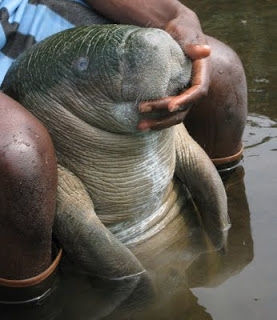
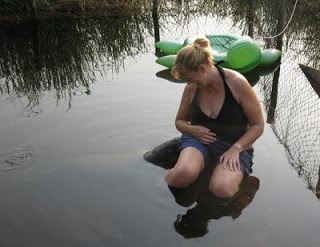 In his first 9 months, Victor struggled with skin wounds and to gain weight. But now he’s healthy and rapidly getting fat. We owe alot of this to the efforts of Jonathan, the Masters student from Puerto Rico who spent 4 months here and trained the caretakers. Since I arrived in Gabon Victor’s gained 6 kg! As of last week he weighs 38.5 kg and has started to nibble at roots in his new enclosure (which had to be built because the old one was too shallow as the water receded in the dry season). The new enclosure was a gigantic labor of love by Rich and the 3 manatee caretakers here, Brice, Davy and Junior, because they had to hack it out of dense brush at the edge of the lagoon. Everything we learn about Victor is new information about West African manatees and therefore very valuable in our understanding of the species.
In his first 9 months, Victor struggled with skin wounds and to gain weight. But now he’s healthy and rapidly getting fat. We owe alot of this to the efforts of Jonathan, the Masters student from Puerto Rico who spent 4 months here and trained the caretakers. Since I arrived in Gabon Victor’s gained 6 kg! As of last week he weighs 38.5 kg and has started to nibble at roots in his new enclosure (which had to be built because the old one was too shallow as the water receded in the dry season). The new enclosure was a gigantic labor of love by Rich and the 3 manatee caretakers here, Brice, Davy and Junior, because they had to hack it out of dense brush at the edge of the lagoon. Everything we learn about Victor is new information about West African manatees and therefore very valuable in our understanding of the species.
Victor’s new enclosure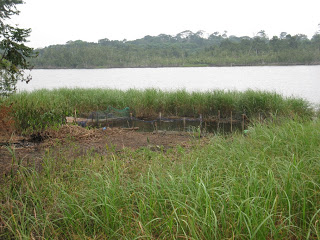 We all dribble when we’re sleepy! Victor still gets fed every 3 hours around the clock except between midnight and 6am.
We all dribble when we’re sleepy! Victor still gets fed every 3 hours around the clock except between midnight and 6am.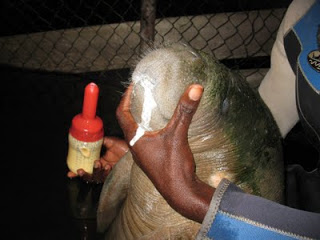 Victor immediately checked out aquatic plants I “planted” in his enclosure. We are encouraging him to investigate plants that manatees eat in the wild here, and he’s already eating some roots. In a few months he’ll be transitioned off the bottle of milk and on to a regular diet of local plants.
Victor immediately checked out aquatic plants I “planted” in his enclosure. We are encouraging him to investigate plants that manatees eat in the wild here, and he’s already eating some roots. In a few months he’ll be transitioned off the bottle of milk and on to a regular diet of local plants.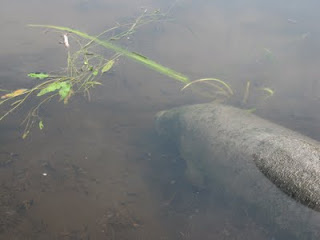 The evidence: each morning we found newly exposed and partially chewed roots at the bottom of Victor’s enclosure.
The evidence: each morning we found newly exposed and partially chewed roots at the bottom of Victor’s enclosure.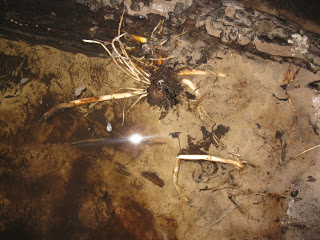 Junior and Brice display a manatee educational panel I had made (thank you Aimee Sanders for your amazing design expertise!) to be used for educational outreach programs here. Victor’s enclosure and Banio Lagoon are in the background. Victor’s story is a great opportunity to educate people in Gabon and other African countries about the importance of protecting manatees and we hope to raise more funds for this important work.
Junior and Brice display a manatee educational panel I had made (thank you Aimee Sanders for your amazing design expertise!) to be used for educational outreach programs here. Victor’s enclosure and Banio Lagoon are in the background. Victor’s story is a great opportunity to educate people in Gabon and other African countries about the importance of protecting manatees and we hope to raise more funds for this important work. 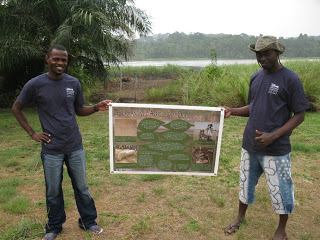 I collected hair and whisker samples from Victor as part of my stable isotope research. This analysis will help me understand when Victor began eating plants in addition to his milk. I am also collecting hair samples from wild manatees to determine food preferences over different seasons and locations. I also collected a genetics sample from Victor.
I collected hair and whisker samples from Victor as part of my stable isotope research. This analysis will help me understand when Victor began eating plants in addition to his milk. I am also collecting hair samples from wild manatees to determine food preferences over different seasons and locations. I also collected a genetics sample from Victor.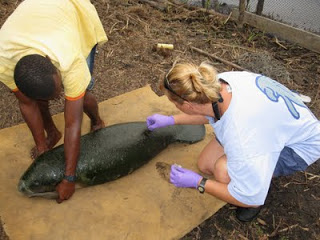 Victor’s length and girth measurements are taken during each weekly checkup.
Victor’s length and girth measurements are taken during each weekly checkup.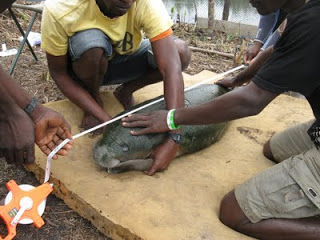 Victor is weighed by a 50 kg hanging scale and a net that he will soon outgrow. We hope to get him a new scale soon! A larger net should be easier to get, pieces are found washed up on the beach occasionally.
Victor is weighed by a 50 kg hanging scale and a net that he will soon outgrow. We hope to get him a new scale soon! A larger net should be easier to get, pieces are found washed up on the beach occasionally.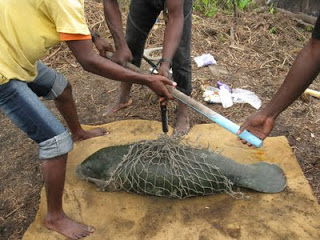 Victor gets his algae gently scrubbed off after his health assessment.
Victor gets his algae gently scrubbed off after his health assessment.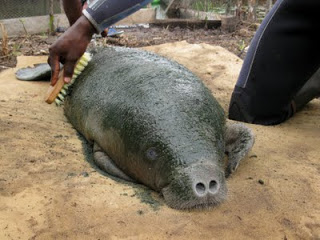 Next, I headed off down Banio Lagoon in search of wild manatees….
Next, I headed off down Banio Lagoon in search of wild manatees….

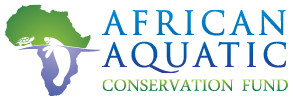
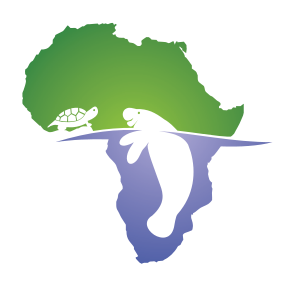
No Comments